Silent Era Home Page > Home Video > Silent Shakespeare

Reviews of silent film releases on home video.
Copyright © 1999-2025 by Carl Bennett
and the Silent Era Company.
All Rights Reserved. |
|
Silent
Shakespeare
(1899-1911)
|
Contents: King John (1899), The Tempest (1908), A Midsummer Night’s Dream (1909), King Lear (1910), Twelfth Night (1910), The Merchant of Venice (1911) and Richard III (1911).
In the British Mutoscope & Biograph Company’s production King John (1899) not much happens other than grand British actor Herbert Beerbohm Tree writhing on King John’s throne, attended by a caring Prince Henry. The scene of less than a minute is played in front of a painted flat for scenery.
The one-reel film The Tempest (1908), produced in England by the Clarendon Film Company, is the first film in the collection that attempts to tell a story. Prospero, with the young Miranda, seeks refuge away from the world on an island. Calaban is discovered on the island. The fairy Ariel is freed from a tree. Prospero then concocts the tempest. A ship is wrecked and Ferdinand, washed ashore, promptly begins wooing Miranda. Prospero intervenes turning Ferdinand into a lumberjack. Love prevails however. Antonio and party are tricked by Ariel. Everything doesn’t quite gel however. The film is successful only at stringing together pastiches of Shakespearean scenes. Studio photography with painted flats a la Méliès is combined with location work. The filmmakers do pull off a tricky in-camera matte shot, with scale model and live photography combined in the matte.
Vitagraph’s A Midsummer Night’s Dream (1909) starring Maurice Costello, Julia Swayne Gordon and a very young Gladys Hulette is a fairly entertaining film, with William V. Ranous as Bottom being a comic standout. The film audience would still have had a passing familiarity with the play to make sense of the lengthy expositional intertitles. The film covers a lot of Shakespearean ground in the length of a reel, but there is some semblance of a beginning, middle and end to the story. Who can tell how funny this film would have been to 1909 audiences? Today, at least, the film is entertaining and quite watchable.
King Lear (1910) is a Film d’Arte Italiana production starring Ermete Novelli and Francesca Bertini. Once again, much is packed into a film lasting just 16 minutes. Novelli makes an interesting and visually striking Lear.
Twelfth Night (1910) is another Shakespearean Vitagraph production in one reel. Again, as appears to be Vitagraph’s style, we have lengthy expository intertitles. One can see evidence that Vitagraph lasted longer than the other pioneering film companies by producing films of higher quality.
The Merchant of Venice (1910) is another Italian production starring Ermete Novelli and Francesca Bertini. The film looks as though it has been shot on location in Venice. Novelli, here again, makes a pleasing Shylock. However, Olga Novelli is a mannish-looking woman who disguises herself as a male lawyer, looking every bit like a man dressed as a woman dressed as a man.
Will Barker’s Richard III (1911) was produced in England. The staging is routine and theatrical, with painted backdrops and scenery, but with a higher number of extras in the frame than usual for a production shot entirely in a motion picture studio. The floorboards of the studio are clearly visible in the foreground of each shot. Sir Frank Benson’s Richard is more flexible and mobile than other interpretations of the character.
— Carl Bennett
|
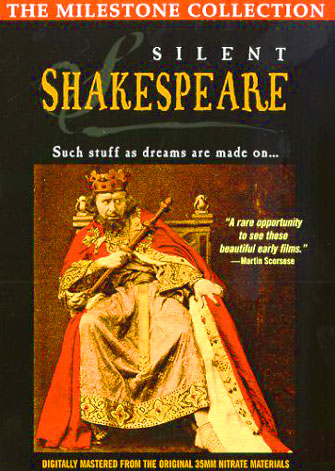 The Milestone Collection The Milestone Collection
2000 DVD edition
Silent Shakespeare (1899-1911), color-tinted and color-toned black & white, 89 minutes, not rated, including King John (1899), black & white, ? minutes, not rated, The Tempest (1908), black & white, ? minutes, not rated, A Midsummer Night’s Dream (1909), black & white, ? minutes, not rated, King Lear (1910), black & white, ? minutes, not rated, Twelfth Night (1910), black & white, ? minutes, not rated, The Merchant of Venice (1911), black & white, ? minutes, not rated, and Richard III (1911), black & white, ? minutes, not rated.
Milestone Film & Video, distributed by Image Entertainment,
ID9224MLSDVD, UPC 0-14381-92242-4.
One single-sided, single-layered, Region 0 NTSC DVD disc; 1.33:1 aspect ratio picture in full-frame and windowboxed 4:3 (720 x 480 pixels) interlaced scan image encoded in SDR MPEG-2 format at 5.0 Mbps average video bit rate (capable of progressive scan upscaling to ? fps); Dolby Digital (AC3) 2.0 stereo sound encoded at 224 Kbps audio bit rate; English language intertitles, no subtitles; chapter stops; snapper DVD case; $29.99.
Release date: 6 June 2000.
Country of origin: USA
Ratings (1-10): video: 8 / audio: 9 / additional content: 0 / overall: 8.
|
|
Milestone Film & Video has released the first high-quality home video collection of silent era Shakespeare films on DVD, a collection originally released on VHS videotape in February 2000. This intriguing collection is of high interest to silent film collectors for its compilation of rare films and its unusual subject matter. The presentation includes several films recently preserved by the British Film Institute and includes new music scores performed by a small orchestra.
The 35mm positive print of King John (1899) was nearly 100 years old when restored and maintains a broad range of greytones and relatively sharp detail, with some emulsion decomposition late in the film in the right side of the frame. Moderate frame jitters in the print causes several blurred video still frames, which are not noticed as such during normal playback. In his book The British Film Catalog: 1895-1985, Denis Gifford lists different actors and character names for the supporting players than those credited on the DVD.
The color tinted 35mm print of The Tempest (1908) is moderately scuffed and speckled, but the image remains largely free of frame jitters. Image detail and sharpness is very good.
The A Midsummer Night’s Dream (1909) print utilized for the transfer was a sharp 35mm color toned print, with a broad range of greytones, moderate speckling and light print damage.
King Lear (1910) has been transferred from an original English language version of the film prepared for released in either Great Britain or the USA. The detailed, sharp 35mm print features hand-tinted color, with some constant marring by processing flaws (or the beginnings of print decomposition) that are distracting. The print switches to a color tint in the middle of a shot at 2:30 into the film. The print again changes at 13:09 to a sepia color toning, we think for dramatic effect, and the remainder of the film is color tinted.
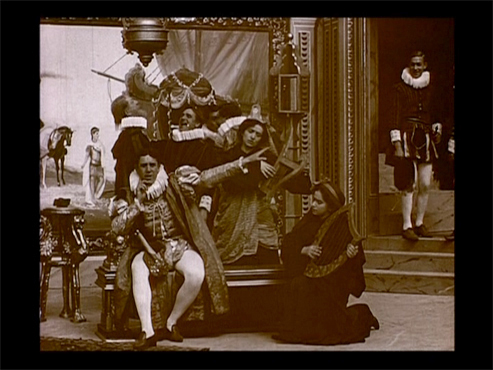
The surviving material for Twelfth Night (1910) is sharp in image detail but is a scuffed and worn 35mm print that is color-tinted and toned. The print is missing the main title card and has a moderate case of frame jitters. There are several splices throughout the film, which leads BFI to list the film as surviving in a fragmentary form.
The transfer of The Merchant of Venice (1911) is again from a original hand-tinted English language version of the film. The print, running less than 10 minutes, is riddled with splices. The worn print is moderately speckled in the same fashion as is King Lear, with print flaws that border on the distracting.
The lightly color-tinted two reel 35mm print of Richard III (1911) is lightly speckled but sharp, with broad greytones and some light print marring in the form of dust and light scuffing. The image jumps about from frame jitters a little more than other films of its vintage.
All of the video transfers of films in Silent Shakespeare have been windowboxed to allow the maximum image area to remain visible on all television monitors. For this alone we applaud Milestone Film & Video and the British Film Institute, producers of the original home video program. We also admire the exceptional stereo music score by Laura Rossi, performed by a dozen or so musicians on a variety of instruments.
In Silent Shakespeare, we have the opportunity to see several actors known for their Shakespearean interpretations preserved for all time (we hope) on film. We also have an opportunity to study the side-by-side productions of Vitagraph and the Film d’Arte Italiana. We like this collection very much and recommend it to silent film collectors and to Shakespearean enthusiasts equally.
|
This Region 0 NTSC DVD edition has been discontinued
and is . . .
|

|
|
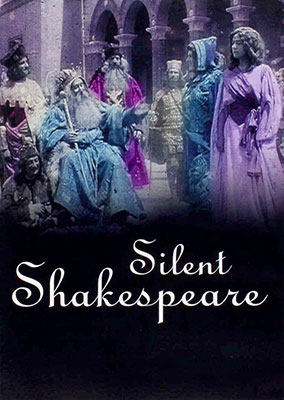 BFI Video Publishing BFI Video Publishing
2004 DVD edition
Silent Shakespeare (1899-1911), color-tinted and color-toned black & white, 89 minutes, BBFC Classification E.
BFI Video Publishing, unknown catalog number,
unknown UPC number, unknown ISBN number, EAN 5.03567E+12.
One single-sided?, single-layered?, Region 2 PAL DVD disc; 1.33:1 aspect ratio picture in full-frame and windowboxed 4:3 (720 x 576 pixels) interlaced scan image encoded in SDR MPEG-2 format at ? Mbps average video bit rate (capable of progressive scan upscaling to ? fps); Dolby Digital (AC3) 2.0 stereo sound encoded at ? Kbps audio bit rate; English language intertitles, no subtitles; chapter stops; standard DVD keepcase; £19.99.
Release date: 25 October 2004.
Country of origin: England
|
|
This British Film Institute DVD edition features identical content to the Milestone edition noted above, with music score by Laura Rossi, and adds an introduction and commentary by Judith Buchanan, lecturer in Film Studies at the University of York, sleeve notes by Nicci Gerrard, and a bibliography. Since the Milestone edition was prepared from video masters originally created by the BFI for VHS release, expect this edition to be of similar or better quality.
North American collectors will need a region-free PAL DVD player capable of outputting an NTSC-compatible signal to view this edition.
|
This Region 2 PAL DVD edition has been discontinued
and is . . .
|

|
|
|
Other SHAKESPEARE FILMS of the silent era available on home video.
Other EARLY FILMS OF THE SILENT ERA available on home video.
Other SHORT DRAMA FILMS of the silent era available on home video.
|
|

LINKS IN THIS COLUMN
MAY TAKE YOU TO
EXTERNAL WEBSITES
•
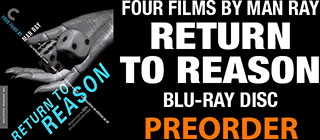
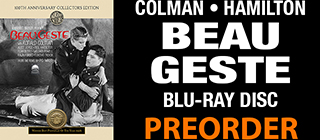










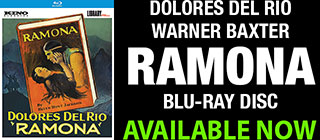

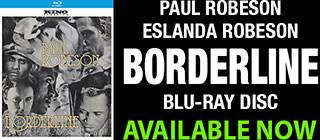





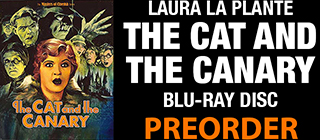
•
|




































